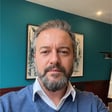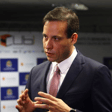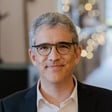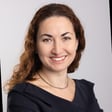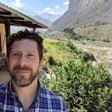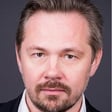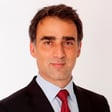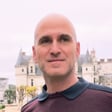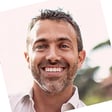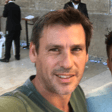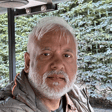Become a Creator today!Start creating today - Share your story with the world!
Start for free
00:00:00
00:00:01

Alex Von Goertz
Recommended
Transcript
Introduction and Career Beginnings
00:00:01
joewaltman
All right, today we've got Alex Von Goertz. Alex, thank you so much for joining.
00:00:05
Alex von GOERTZ
Thank you, Joe, it's great to talk to you.
00:00:08
joewaltman
ah First question, same as always. Refresh your memory. What were you doing before you went to INSEAD? And what have you been up to for the last 20 years?
00:00:17
Alex von GOERTZ
Okay, so I studied environmental engineering in Vienna, and in parallel, I also studied philosophy. And then in 1997, I started working for a small Austrian company, which was doing water supply, mainly in in Central and Eastern Europe, and in the Balkan region.
00:00:35
Alex von GOERTZ
So I started as a project manager. I went to places like Bosnia and Bulgaria trying to fix the water supply systems in in many of these countries.
00:00:45
joewaltman
Was it, what would the systems have been broken for the reasons I think due to the the the conflict in those areas?
Challenges in Water Infrastructure
00:00:53
Alex von GOERTZ
ah to some extent yes and very often they also blamed the conflict for things which later on turned out to be not working ever um and it so it was also the time of transition in general in in Central and Eastern Europe and especially in former Yugoslavia so the There were a lot of changes going on and a lot of the infrastructure was just dilapidated. And of course, water supplies is is pretty essential. So governments from all over the world and also international banks were giving money to and to support fixing the water supply systems or to improve them. And so that's what I did. First as a project manager, engineer, and then a project manager. I did that for about five
Pursuing Business Education at INSEAD
00:01:40
Alex von GOERTZ
years. and
00:01:41
Alex von GOERTZ
um Apart from Central Eastern Europe, we also worked quite a bit in former Soviet countries like Kyrgyzstan and Kazakhstan. ah and yeah so um After three or four years, I realized, okay, this is quite interesting, but at the same time, I also feel like if I want to proceed, I should add on something to my CV. and and so I developed the idea of going to business school and Since I was already about 30, I thought, okay, one year program would be long enough for me.
00:02:16
Alex von GOERTZ
And I wanted to go to a top rated school. So I applied for insert. This was the only school I applied and I was a bit surprised, positively surprised that they accepted my application.
00:02:27
joewaltman
But let me ask, as as i mean i mean as as I'm um ah um a dumb American, I you know had never really even heard of in Seattle until I was quite old. ah And then you know still to this day, I think none of my friends or family have ever really heard of it other than what than than what i've the fact that I've gone. is it Were you aware of it from an early stage, or or did you discover it later as well?
00:02:47
Alex von GOERTZ
I became aware of it through a few friends who who went there a few years ahead of me, like three to five years ahead. And so when they came back and then we spoke about that.
00:02:57
joewaltman
OK.
00:02:58
Alex von GOERTZ
So that that's why I knew it in general, insert even today is is not that well known in Austria.
00:03:04
joewaltman
Yeah. Yeah. So carry on. Thank you.
Post-INSEAD Career Moves
00:03:08
Alex von GOERTZ
Yeah, so I was actually in Kazakhstan when I received the application the the confirmation that my application was accepted and okay, I went to Fontainebleau and spent first three periods there, now two periods and then one period Singapore and the the rest in Fontainebleau again. Like most Europeans, I wanted to escape in January, February.
00:03:31
Alex von GOERTZ
ah Yes, and so then that that's basically the story up to July 2003. And my wife, who had been with me most of the year in Insead, she came with me then after after um leaving France, which went back to Austria. I took some time for the job search. It was also a time of yeah the economic situation wasn't the best. So it wasn't that easy to find a job, especially if you looked into maybe changing the sector or going into ah into a totally new role.
00:04:07
Alex von GOERTZ
um Also in that time we got married which was of course a personal highlight and the other the job search dragged on a bit and so in the time in the meantime I also spent some time in the army which I had done before as well to to to bridge the time.
00:04:23
joewaltman
Hold on, hold on let's let'sing on.
00:04:23
Alex von GOERTZ
and and
00:04:25
joewaltman
What does that mean? you You can sort of go in and out of the army as as as you wish?
00:04:28
Alex von GOERTZ
well
00:04:29
joewaltman
How does that work?
00:04:29
Alex von GOERTZ
i mean i After school i I did my service for a year and I became and an officer of the of the reserves And then once you're in in that system, you have some regular trainings, but you can also do additional trainings to advance in the ranks.
00:04:47
Alex von GOERTZ
But also they their so sometimes look for certain stuff to come for a few weeks.
00:04:53
joewaltman
Is it compulsory in in Austria?
00:04:53
Alex von GOERTZ
or It's compulsory, but only for for six months.
00:04:58
joewaltman
okay Okay.
00:04:58
Alex von GOERTZ
And and up to now, I did more than two years, I think three years almost then.
00:05:03
joewaltman
Interesting.
00:05:04
Alex von GOERTZ
Yeah. and Then in in early 2004, I got a job in Vienna at the bank, which was doing public finance, originally only in Austria. But then at that time, they had started to look into central and eastern Europe, and they wanted to expand into that region, which made sense because it's very close. And and there was a big demand for for public finance. it was basically unknown until then in during the communist times in in these countries and so the idea of the bank was to to support this expansion through a consulting team which was mainly consisting of engineers who who knew about infrastructure in my case mainly environmental infrastructure and the idea was to get in touch with the municipalities in the target countries to not only straight away offer them
00:05:59
Alex von GOERTZ
financing but also to show them we do understand the particular or the technical requirements of your um of your infrastructure demands and also to support them in in showing them how they could apply for EU co-financing or EU grants because the European Union was giving a lot of grants in in preparation of EU accession but also to stabilize these countries. So especially for infrastructure projects they they could get a lot of grant financing but in most countries they they didn't have really the knowledge yet on on how to go about that. So that was the idea to set up a consulting team and I i was in charge of doing that. um yeah i did It went quite well but at the same time we were mainly a marketing tool for the bank I must say which also limited or limited what we could do especially in in terms of which countries we could work in etc.
00:06:56
Alex von GOERTZ
and um
00:06:57
joewaltman
Specifically around EU new members, you you were sort of targeting those sorts of things.
00:07:00
Alex von GOERTZ
new members or or countries in the Balkans, which weren't really on the path of EU accession yet, but they were in the neighborhood and the EU had certain programs to to support these countries, although they were not on the road to EU accession yet.
Consulting in Munich and Donor Projects
00:07:19
Alex von GOERTZ
And so, yeah, that's what we did. In the meantime, also, our daughter was born, which was another big highlight, of course. um Yes, and as I said, it was a marketing tool mainly for for this bank.
00:07:31
Alex von GOERTZ
and then it was a bit limited and at the same time also I was looking um two four for opportunities to maybe move away from Vienna further west a bit and then in 2007 I received an offer to join a ah German company based in Munich. It was actually a well-established consulting company which had gone through bankruptcy and they were doing a restart and they were looking for somebody to take over their department for international projects in the water and sanitation sector. so So that's what I did. And most of these projects were actually financed by international donors, which means governments like German government or Swiss government or multilateral development banks like the World Bank or the EIB.
00:08:18
Alex von GOERTZ
We're providing finance in order to get some water and sanitation projects and investments done in the partner countries, which were mainly developing countries and transition countries, a lot of countries in in southeastern Europe, but also in the Balkans, in the Middle East, some small island states like the Seychelles or in the Caribbean, Saint Martin, Bonaire, et cetera.
00:08:46
joewaltman
what You use the word donors. Does that imply there it was it was sort of a not-for-profit philanthropic thing?
00:08:49
Alex von GOERTZ
Yes.
00:08:54
joewaltman
or or
00:08:55
Alex von GOERTZ
Well, we were a profit-oriented company, but the the donors, basically, the German government was providing finance for consulting services, for engineering services, for works to be done in order to improve water and sanitation in their partner countries, as they call them. So these are developing countries that Germany made an agreement with or other countries made an agreement with to support them.
00:09:24
Alex von GOERTZ
So our work was was not um for free. We were basically working on a purely commercial basis. But the this particular situation there was that the clients, the beneficiaries, were not paying for the services.
00:09:42
Alex von GOERTZ
It worked.
00:09:42
joewaltman
the German government was or or whoever was.
00:09:43
Alex von GOERTZ
government or the bank etc and that leads often to tricky situations because they don't necessarily have the same view of of things.
00:09:44
joewaltman
Yeah, yeah okay.
00:09:48
joewaltman
Yeah.
00:09:52
Alex von GOERTZ
So quite often especially the the beneficiaries in the target countries had had a different agenda than than the donors and they wanted certain companies to get the jobs and and these kind of things.
00:10:04
Alex von GOERTZ
So as a consultant it was quite likely to get between the lines and to be accused from one side or from both sides of doing something wrong because the the financing institution and the beneficiary often wouldn't agree.
00:10:15
joewaltman
Yeah.
00:10:20
Alex von GOERTZ
But at the same time it was also interesting because I came to visit many countries and worked with people from almost all over the world I would say.
00:10:20
joewaltman
Interesting.
00:10:30
Alex von GOERTZ
um It was also challenging I must say there's a real lot of bureaucracy Of course, in in many of the countries that we worked in, so dealing with public administration in Egypt or Zimbabwe can be quite tiring. At the same time, the the development banks and also the governments who give the money, they they also have a lot of bureaucratic requirements, a lot of formalism, reporting, et cetera. So that requires quite a lot of patience and stamina. And of course, you have to be careful not to totally erode your margins by fulfilling all the requests which you receive because these are all time consuming. And quite often the projects were also in taking place in areas with with a difficult political situation, with sometimes post-conflict or ongoing conflicts. We didn't work in countries where there was an open conflict going on.
00:11:28
Alex von GOERTZ
But quite often we had to, at least four or five times, we had to evacuate our staff from various countries. For instance, in Egypt, we had two offices when the Arab Spring started and suddenly the lines of communication were cut and we had, I don't know, maybe 10 European staff there and a lot of local staff and we had to find out where are they, how can they get to the airport, how can they get home or how can they get across the border.
00:11:43
joewaltman
Mm.
00:11:54
Alex von GOERTZ
so and And I was, of course, in in charge of yeah organizing these things. So that was at times quite quite stressful, but as I said, also quite interesting. So I did that for about nine years.
Focus on Northern Africa and Middle East
00:12:10
Alex von GOERTZ
What we did so was mainly feasibility studies, designs, detailed designs of water supply systems, wastewater treatment plants, sewage systems, tendering for works contracts to find works contractor, construction supervision.
00:12:25
Alex von GOERTZ
on site basically and also institutional support. So a lot of the problems which these countries are facing in water supply and sanitation are not technical problems really but often a lack of operational maintenance or wrong operation maintenance procedures. So so we provided some support there as well.
00:12:48
joewaltman
I don't want to get too off on too much of a tangent, but but the work you're describing, um and I've only recently learned of this, I'm sure this is common knowledge to yourself and many other the people, but it kind of sounds like the the Chinese Belt and Road Initiative, except initiated by by by European governments, not not not not China. Can you talk to how, kind of are they basically the same thing or are there different you know ah levels of ambition or or you know ah implementation details to to China's program versus what you were working on.
00:13:20
Alex von GOERTZ
I wouldn't say it's the same thing, but there's certainly some similarity. And of course, when I got into his this, I was naive enough to think, okay, we're just going there to to help. But of course, that's only one part of the story. I mean, yes, the governments to some extent do want to provide some humanitarian aid and they do want to ah communicate to the population in Europe. We're doing something for these countries.
00:13:45
Alex von GOERTZ
But really, truly, there is there's definitely political agenda. So by financing various sorts of projects in the partner countries, the governments of the Western world, let's say, are trying to to stay in touch with these governments, to to to be on good terms with them, to compete with countries like China. not Especially in Africa, it's clearly a competition between the donors to who has more influence. At the same time also they they support, of course, the export from their own countries because a lot of of the consulting services, but also of the supplies and works are often coming from the country which is financing the projects.
00:14:26
Alex von GOERTZ
So I wouldn't say it's the same, but there is certainly similarity. And it's definitely not only about helping.
00:14:35
joewaltman
Philanthropy, yeah, there's some self-interest, yeah.
00:14:36
Alex von GOERTZ
No, no, no, definitely not.
00:14:38
joewaltman
Yeah, interesting. interesting Thank you.
00:14:41
Alex von GOERTZ
Which is also a thing which which can make make it a bit frustrating after a while.
00:14:48
joewaltman
Yeah.
00:14:48
Alex von GOERTZ
yeah Because, so for instance, ah there's also a lot of corruption going on. And and quite often when you're trying to hint to the fin to the donors about that, they're not too interested often in hearing about it because they'll be in trouble is stay if they have to deal with it. So that can be a bit disappointing sometimes.
00:15:10
joewaltman
yeah yeah I'd love to hear some some ah examples of of that if to to the extent you're allowed to talk about it.
00:15:16
Alex von GOERTZ
Especially during construction ah supervision, a lot is going on and then more than once we were threatened of being kicked out if we were continuing to do our job properly because...
00:15:30
joewaltman
Because the local, the people on the ground, wherever you were, wanted to use their their preferred suppliers and subcontractors and whatnot.
00:15:39
Alex von GOERTZ
Yes, and they wanted to to to waive certain works which we believed were not done correctly because that was connected to payments to the contractor and
00:15:45
joewaltman
Okay.
00:15:51
Alex von GOERTZ
I mean I can't prove it but payments to the contractor are often connected to payments to to some other people on on the client side.
00:15:58
joewaltman
Yes. Yeah. Interesting. Yeah. well All right.
00:16:02
Alex von GOERTZ
So so they they could get very aggressive sometimes against us for for for things which we thought they should be happy that we point them out.
00:16:02
joewaltman
So where are we from? your ah
00:16:12
joewaltman
yeah well i mean that that I don't want to dig too much into this, but this this is sort of the fun, spicy stuff. like ah Presumably, ah people have disappeared for far far less dollar amounts than you're talking about in some of these projects. How how concerned or were you about you know your your your physical safety?
00:16:29
Alex von GOERTZ
It didn't get that bad, but we had a few cases where we had to to pull out our project managers. of various reasons either because they were getting in conflict or sometimes also we had some doubts whether they were really doing what they should do because you know I'm not standing next to them all day long and I'm in Germany and they are somewhere far away and so you you don't sometimes when we got the feeling you know there might be something fishy then we we had to replace some stuff
00:17:00
joewaltman
yeah Let's get back to your timeline. where ah you You were in this role for nine years.
00:17:04
Alex von GOERTZ
Yeah, so that was from 2007 onwards. So I did that for nine years. And that was a mid-sized German engineering group. And in 2016, through a contact, I got an offer to to basically take over a similar role, but in a different context for a Swedish group, a large group with about 18,000 staff and I was doing again donor financed water sanitation environmental projects for the German subsidiary of this of this Swedish company. So the office was based in Frankfurt and the headquarters were in Stockholm.
00:17:43
Alex von GOERTZ
Yeah, so I did that for from onwards. um Again, mainly Africa, some different countries. We moved into Northern Africa, Tunisia, Morocco, and also, which was new to me, more to the Middle East, including some countries like difficult countries like Afghanistan and Iraq,
00:18:05
Alex von GOERTZ
um where especially at that time, German government made available a lot of funds for for Afghanistan, um which then suddenly ended when when the Taliban came back. But up to then, we had a lot of stuff there, a lot of local stuff, but also some some international stuff. And so I did that for for more than five years, um but almost six years. But during that time, it also became evident that the whole industry was was getting less attractive, at least for me, because ah
00:18:39
Alex von GOERTZ
Previously, the donors, the financing institutions were saying, OK, we provide finance, mainly grant financing, um as long as and you have to stick to our rules of how this is implemented. This is also included regulations on taxation, work permits, and stuff like that. And then there was a total shift, and the donors said, we give you the money, and you play according to your rules.
00:19:03
joewaltman
Thank
00:19:04
Alex von GOERTZ
which made it much more difficult for us ah to to actually work in many of the countries because suddenly you had to deal a lot with local taxation, with work permits, with yeah residence permits, which became a real headache.
00:19:08
joewaltman
you.
00:19:18
Alex von GOERTZ
And especially tense taxation turned out to be be a real risk factor. So the margins were eroding. We dealt more and more with these administrative topics rather than with our real work.
00:19:32
joewaltman
Hold on.
00:19:32
Alex von GOERTZ
work that
00:19:34
joewaltman
That's surprising. so You're saying that the money people were previously more um prescriptive, shall we say, around around how how their money will be used and they actually loosened up um you know such that the client didn't need to hire you, for example, and probably all sorts of other other things.
00:19:40
Alex von GOERTZ
yes this
00:19:46
Alex von GOERTZ
hello
00:19:51
joewaltman
well that that That seems counterintuitive. but why would they Why would that change?
00:19:55
Alex von GOERTZ
Well, there was a strong um was strong pressure from the from the donor countries saying oh this is like maybe I'm exaggerating a bit post-colonial system and we we want we are we can do this ourselves and you have to accept our tax rules, you have to accept all our whatever we do, how we do things in our country and of course all the recipient beneficiary countries are also represented in the World Bank and and in the multilateral development banks and so they they've been pressurizing for
00:20:09
joewaltman
Okay, okay.
00:20:34
Alex von GOERTZ
Yeah, less control from the financing institutions and they were successful with that and that yeah made it less attractive for us in the end because margins were eroding. Also, it was more difficult to find stuff.
00:20:49
Alex von GOERTZ
because they were also suddenly subject to local taxation in the countries where they were working and for many of our European colleagues it wasn't so interesting to pay into the Tanzanian tax system and and social security system etc.
00:21:06
joewaltman
This is really interesting, and I'm sorry for asking for doing so many tangents, but would you say you know you're obviously biased because you you sort of you didn't benefit from this change? at the end of the day, did this change improve or or or or not? the The quality of the end product, you know of whatever thing they're they're getting built.
00:21:24
Alex von GOERTZ
I mean, my personal opinion, it clearly did not improve the quality. But of course, before you mentioned the the second agenda, which is behind these things here. And so one reason why the donors are giving money, in my opinion, is because they want to be in good terms with with the with the beneficiary countries. They they might have resources which the donor countries are interested in, et cetera.
00:21:53
Alex von GOERTZ
and What many of the beneficiary countries want the most is what they call budget support, so which is the extreme case where they say, we just give you money and you do with the what what you think is is best to do.
00:22:06
Alex von GOERTZ
But from in my opinion, that's the best recipe to achieve nothing. No progress.
00:22:13
joewaltman
yeah
00:22:13
Alex von GOERTZ
In contrast, you you're stabilizing inefficient systems and and often corrupt elites, which are leading certain countries.
00:22:22
joewaltman
Really interesting. All right, let's get back to the ah the the story.
00:22:25
Alex von GOERTZ
Yeah, so yeah that's that's why yeah I got the feeling, okay, it's about time to move on.
Reducing Travel and Shifting Focus to Germany
00:22:34
Alex von GOERTZ
ah At the same time, also the the group that I was working for, they were stocklisted and they became more and more aware of the of the compliance risks which are involved. And so they were becoming more and more careful, and so which I understand in one way, on the other hand, it made it difficult to work.
00:22:53
Alex von GOERTZ
in countries like Albania, et cetera. And at the same time, I was also getting a bit tired of traveling so much. So I thought, OK, maybe it's it's time for a change. And then in 2022, I received a call from the managing director of a company. I knew her for a few years whether I would be interested in in setting up a branch office for a German engineering company, again, environmental engineering.
00:23:23
Alex von GOERTZ
but quite different in what we are doing and also um we are mainly focusing on the German market now and so I thought okay that's a good a good opportunity to um to travel less and to deal less with bureaucracy in far away countries. Let's deal with German bureaucracy.
00:23:43
Alex von GOERTZ
and ah yeah it's it's It's quite an innovative company. It's called Jicon. We've got 600 staff. It's owner managed, which is make makes decision making much faster than in a large stock listed company, which which I find very positive.
00:24:05
Alex von GOERTZ
And so what we are doing is we're providing mainly services for water management and for soil management. So um we we deal with a lot of studies and permitting issues for mainly for industries, but also for public clients. So if you're an industry and you want to to build a plant in a certain area, ah you you might need a study about water availability.
00:24:34
Alex von GOERTZ
you you need certainly need studies about soil contamination to check whether there is soil contamination. If there is what to do about it, can I still build? Can I not build? And then you have to, depending on on what you're doing and what kind of environment you're dealing with, you might have to to do a lot of prepare a lot of studies to to prove that you're not doing any have any negative effects to the to the environment, especially to the water and to the groundwater. You have to um prove to the authorities in order to get construction permit what you're going to do with with rainwater, so how you're going to manage that. um And especially in Germany,
00:25:20
Alex von GOERTZ
now which there's a there's a trend which we've seen in other countries many years ago already water is becoming more scarce and so previously the idea was collect the rainwater put it in a sewer system and into the next river but now as water is getting more scarce groundwater levels are falling in many parts of Germany so now there's a strong shift towards Let's try to capture the water and and keep it in the area where the rainfall happened and try to recharge the groundwater tables rather than to just convey the water into the mixed river. This leads to the local authorities asking for these kinds of solutions in order to give you a construction permit.
00:26:09
joewaltman
I've got a super naive question. I'm curious about having have been exposed myself a little bit as to these sorts of of requirements based on some projects I've been doing. um Which country, and I wonder if you if you aren't the answer, which country on this planet do you think has the most stringent rules around you know all the hurdles you have to clear to build something you know like like like like you work with? Is it Germany or is are there other countries that are more the gold standard?
00:26:35
joewaltman
with a
00:26:37
Alex von GOERTZ
Oh, it's difficult to say because I don't know all the countries, of course. Germany is quite strict.
00:26:40
joewaltman
Okay.
00:26:41
Alex von GOERTZ
And um one thing, which is actually also, of course, ah supporting our business in a way, legislation is changing continuously.
German Regulatory Environment and Support
00:26:51
Alex von GOERTZ
And new rules are introduced.
00:26:53
Alex von GOERTZ
And so the investors for, let's say, real estate projects or industries who want to build something, they they want to get the construction done.
00:27:04
Alex von GOERTZ
and they need support and they know, okay, there's a new regulation on how to deal with soil and construction on construction sites. So they need experts who who can solve the problems for them and and make sure that they fu fulfill all the requirements which are continuously changing. So um Germany, I think has pretty strict rules, but I could imagine that there are other countries which are even stricter. I mean, in my opinion, it's not only to have the goal shouldn't be to have strict rules, but to have
00:27:35
Alex von GOERTZ
simple rules which are efficient. And sometimes that's the question though because certain regulation um leads to a lot of work and a lot of processes, but it's questionable sometimes where that really improves the situation.
00:27:52
joewaltman
Yeah. Easier said than done. Sounds like.
00:27:55
Alex von GOERTZ
Yes, of course, of course, yes.
00:27:55
joewaltman
Let's ah let's wrap this up with with the ah the the standard ending question. um Based on where you are either personally or professionally, is there anything we as the community can do to help you and and vice versa?
00:28:09
joewaltman
Aside from ah maybe fast tracking some building permits in in Germany, what what what what might you be able to do to help us?
00:28:17
Alex von GOERTZ
yeah Well, let me start with the second part of the question. when So feel free to contact me, any of you guys, if you want to discuss anything about the environmental sector in Germany or in Austria or about development cooperation as far as I can, I'm glad to support. And on the um the private side, my wife and I, we are glad to have insert friends over visiting either in Germany or in Austria. We have a nice place in the countryside, so if you want some sound of music feeling near
00:28:49
joewaltman
where Where in Austria? Where in Austria?
00:28:51
Alex von GOERTZ
Salzburg, near Lake.
00:28:52
joewaltman
OK.
00:28:55
Alex von GOERTZ
So it's it's very nice. Come and see us. And yeah, coming to your first the first part of your question, I mean, I've been benefiting strongly from from all the friendships and contacts which I've had in the last 20 plus years through INSEAD.
00:29:11
Alex von GOERTZ
And I'm looking forward to being able to continuing to be able to to contact you guys in case I have a question, whether it's just to meet up or on some private question or also some business related topics. And in this context, your podcasts have proven to be very interesting and useful and entertaining.
00:29:31
joewaltman
Well, thank you. Thank you. i Thank you so much for for for making the time. It was really nice. It was really nice catching up.
00:29:37
Alex von GOERTZ
Thank you, my pleasure.
